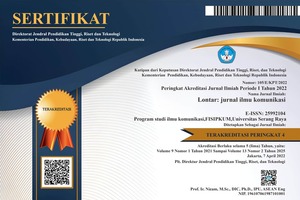Analisis Wacana Kritis Konstruksi Konflik Keluarga dalam Film Cek Toko Sebelah
DOI:
https://doi.org/10.30656/lontar.v7i1.1571Keywords:
Discourse Analysis, Family Conflict, Mass Communication, CTS FilmAbstract
A film is made to represent reality from people's lives. Films can depict various dimensions of life insociety, as well as the one depicted in a comedy film titled ‘Cek Toko Sebelah (CTS)'. This research uses
qualitative research using discourse analysis developed by Teun Van Dijk. With the Van Dijk method,
Discourse Research is not only on text alone, but also how a text is produced. The results of the research
at the text level, obtained a picture of family conflict associated with the label of the majority of Chinese
citizens who are traders. The awarding of the film title also comes from a typical idiom that is often
raised by the Chinese when transacting with the shopper in the shop. In the level of social cognition, this
film shows the representation of the millennial Chinese generation, a picture of the conflict between
choosing a career or family, being obedient to parents and prioritizing the family. In the level of social
context, it seems that the trend of young people in big cities who work and pursue more careers than
continue the tradition and family heritage as well as big businessmen are rulers who do not care about
Chinese or not Chinese. They are shown as citizens who often oppress small entrepreneurs and so on to
submit to their interests.
References
Al-Maqassary, Ardi. Film Sebagai Komunikasi
Massa (2016) Diakses melalui
http://www.ejurnal.com/2014/01/film-sebagaimedia-komunikasi-massa.html
Anonim. (2016, 29 Desember) Review
PICturePLay Cek Toko Sebelah
Rekonsiliasi lewat Komedi. diakses
pada 25 Agustus 2018 melalui
https://pictureplayblog.wordpress.co
m/2016/12/29/cek-toko-sebelahreview-rekonsiliasi-lewat-komedi/
Anonim. Cek Toko Sebelah Ernest Prakasa
.www. Kompas.com
Astuti, Astuti. 2015. Analisis Wacana Isu
Gender dalam Film 7 Hati 7 Cinta 7
Wanita Karya Robby Ertanto, pada
Maret 2018 diakses melalui
http://repository.uinjkt.ac.id/dspace/b
itstream/123456789/32026/1/ASTUT
I-FDK.pdf
BI.Warisan, Strategi Penyelesaian Konflik .
Skripsi pada UNILA 2011 diakses
melalui
digilib.unila.ac.id/925/9/BAB%20II.p
df pada 28 Maret 2018
Darma, Yoce Aliah M.Pd. (2001). Analisis
Wacana Kritis. Yrama Widya Bandung.
Effendi, Onong Uchjana. 2003. Ilmu Teori dan
Filsafat Komunikasi. Bandung :
Cipta Aditya Bakti.
Eriyanto. 2006. Analisis Wacana Pengantar
Analisis Media. Yogyakarta : LKIS.
Fitri, Khonita. Profil & Biodata Ernest Prakasa.
diakses pada 25 Agustus 2018
melalui
https://www.kepogaul.com/seleb/biod
ata-ernest-prakasa/
Hamad, Ibnu. 2004. Konstruksi Realitas Politik
dalam Media Massa: Sebuah Studi Critical
Discourse Analysis Terhadap Berita-berita
Politik. Jakarta: Granit.
Hidayat, Deni. 2016. Konflik Keluarga . Diakses
melalui diakses pada 27 Maret 2018
mellaui
https://blog.uad.ac.id/deni140000123
/2016/07/26/konflik-keluarga/
Kamus Besar Bahasa Indonesia. Diakses melalui
Mc Quail, Dennis. 1987. Teori Komunikasi
Massa : Suatu Pengantar. Edisi ke-2.
Jakarta : Erlangga.
Mujib, Abdul. 2013. Analisis Wacana Novel
Sepatu Dahlan Model Teun A. Van
Dijk pada UIN Sunan Ampel
Surabaya yang diakses pada 12
Februari 2018 melalui
http://digilib.uinsby.ac.id/10697/ .
NF. Laela. 2015. Konflik dalam Keluarga.
Skripsi pada UIN Surabaya. Diakses
melalui
digilib.uinsby.ac.id/3453/4/Bab%203
.pdf pada 26 Maret 2018
Nissa, Salama Khairun. (2012) Pelestarian
Budaya Melalui Media Film
(Analisis Isi Pelestarian Seni Bela
Diri Pencak Silat Minang Kabau
Pada Film Merantau). diakses pada
Maret 2018 melalui
http://digilib.unila.ac.id/18046/
Nur, Sukasih.2008. Analisis Wacana Pesan
Moral dalam Film Naga Bonar Karya
Asrul Sani. Skripsi pada Prodi KPI
UIN Syarif Hidayatullah Jakarta
Diakses pada 21 Februari 2018
melalui
http://repository.uinjkt.ac.id/dspace/
bitstream/123456789/18895/1/SUKA
RSIH%20NUR-FDK.pdf
Setiawan, Wahyu. (2016, 21 Desember). Cek
Toko Sebelah: Film tentang
Kehidupan Keluarga yang Dikemas
Secara Komedi.. Published 8:57 AM,
December diakses pada 21 Februari
melalui
https://www.rappler.com/indonesia/g
aya-hidup/156154-film-cek-tokosebelah-dari-ernest-prakasa
Downloads
Published
Issue
Section
License
By submitting an article to the journal, the author(s) agree to transfer the published article's copyright to the journal, which will act as the publisher. This means the journal will have the right to publish the article in various forms, including reprints. The journal will maintain the publishing rights to the published articles.
In line with the license, authors and third parties (readers, researchers, and others) are allowed to share and adapt the material. In addition, the material must be given appropriate credit, provided with a link to the license, and indicated if changes were made. If authors remix, transform, or build upon the material, authors must distribute their contributions under the same license as the original.






